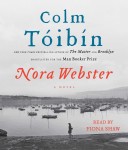In Defense of Audiobooks
Do audiobooks still need defending?
At least one person thinks so. Ten years after the New York Times looked into whether listening to audiobooks was “real” reading, or just “oral CliffsNotes for reading lightweights,” Claire Armistead asks a similar question in the Guardian, “Reading with your ears: do audiobooks harm or help literature?” She quotes American literary critic Harold Bloom, who told the NYT that reading text is superior, “Deep reading really demands the inner ear as well as the outer ear. You need the whole cognitive process, that part of you which is open to wisdom. You need the text in front of you.”
She also quotes Neil Gaiman, a brilliant reader of his own work, who said that same year (via his blog) that Bloom’s comments are,
“just snobbery and foolishness … I don’t believe there are books I’ve never ‘read’ because I have only heard them, or poems I’ve not experienced because I’ve only heard the poets read them. Actually, I believe that if the writer is someone who can communicate well aloud (some writers can’t), you often get much more insight into a story or poem by hearing it.”
The New Yorker jumped into the fray seven years later, also refuting Bloom.
 Armistead explores the issue for herself by comparing the experience of reading and then listening to Colm Tóibín’s Nora Webster, (S&S Audio, 2014). The novel left her flat in print but thrilled her in audio (listen to an excerpt here, read by the brilliant Fiona Shaw, who also talks about reading the book here).
Armistead explores the issue for herself by comparing the experience of reading and then listening to Colm Tóibín’s Nora Webster, (S&S Audio, 2014). The novel left her flat in print but thrilled her in audio (listen to an excerpt here, read by the brilliant Fiona Shaw, who also talks about reading the book here).
You have to wonder if Bloom, now 85 and at an age when many discover new appreciation for audiobooks, still feels the way he did ten years ago.

November 13th, 2015 at 1:36 pm
If I read a book and love it, I will then get the audio because I can get EVEN MORE out of it. If an author I love comes out with a book that I can’t get into, I get the audio and almost always enjoy it. I am a Reader’s Advisor and Fiction Collection manager, if you don’t have time to read a book, but have time to listen while you do other things, do it. Format snobbery is the same a genre snobbery, probably ineradicable.
November 18th, 2015 at 4:38 pm
Listening to a book requires a different part of the brain than reading text but it is equally as valuable. I agree that sometimes you get more out of a book by listening to it. For me, a good example of this is listening to a classic where the language can be dated or more formal than what is used today. I find a talented narrator can bring a book like that to life for me. Or a well done accent can take you into a setting and create far more atmosphere than if I were reading the text. I can’t think of a better way to spend a lazy afternoon than escaping into a fabulous audio book.